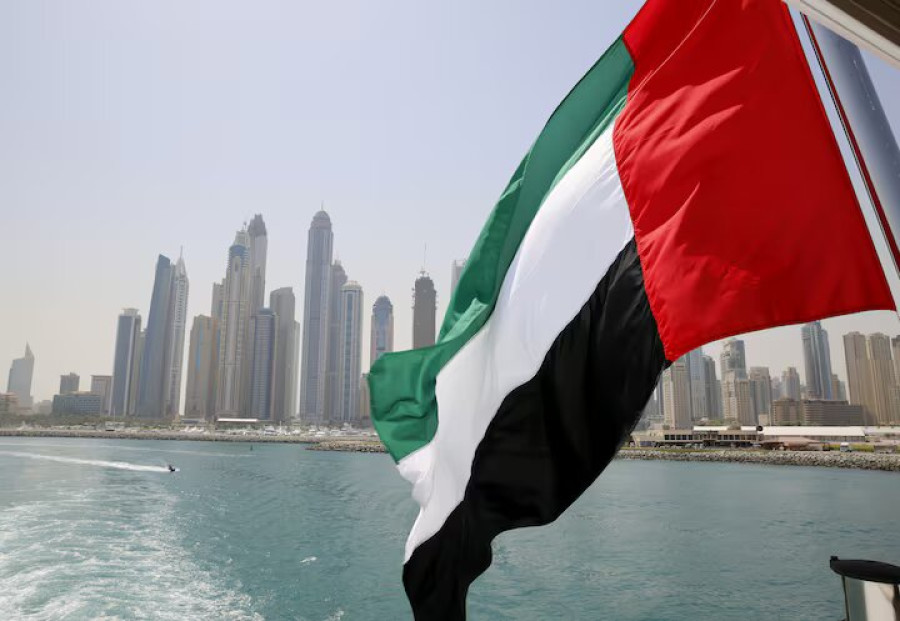National
Up to 10,000 Nepalis may avail of UAE’s new amnesty scheme
Emirate amnesty for undocumented foreigners will let them hold job or leave without fines. Scheme remains valid till October-end.
Anil Giri
The decision of the United Arab Emirates government to provide amnesty to foreign nationals either to resume work, or leave the country within two months, has come as a boon for thousands of Nepali migrant workers living and working in the Emirates.
On September 1, the UAE government announced that it would grant amnesty to all undocumented foreigners living in the country. This includes the option to either continue working by producing valid job offers or to leave the country without paying any fines for overstaying.
Nepali Ambassador to the UAE Tej Bahadur Chhetri told the Post from Abu Dhabi that this move could benefit between 5,000 to 10,000 Nepalis.
During a meeting with Chhetri on Thursday, Director General at the General Directorate of Residency and Foreigners Affairs in Dubai, General Lieutenant Mohammed Ahmed Al Marri, stated that the UAE hosts as many as 10,000 Nepali nationals who are staying there illegally.
While Chhetri estimates that over 600,000 Nepalis reside in the Emirates, the Non-resident Nepali Association (NRNA) and other Nepali organisations put the figure closer to 700,000.
The amnesty offer will be valid until October-end. The Nepali Embassy in Abu Dhabi, with support from the NRNA and the Nepali community, has set up a help desk in Dubai to help those in need. The applicants who desire to regularise their residency status can apply for a short-validity passport at the embassy and those wishing to return to Nepal should apply for out-pass.
The programme was announced by the Federal Authority for Identity, Citizenship, Customs & Port Security (ICP) and will run until October 30, 2024.
Under this initiative, individuals with expired visas of all types, including tourist and residency visas, can either adjust their status to continue living and working legally in the UAE or leave the country without incurring fines or facing entry bans.
The amnesty also covers individuals born in the UAE without official documentation and those who have absconded from their sponsors. However, it does not apply to those who entered the country illegally.
During the meeting with Chhetri, Marri also expressed his readiness to extend all possible cooperation to Nepali citizens in the UAE and the Nepali embassy in case they need help.
Chhetri thanked him for providing such an important and excellent plan for the undocumented individuals, which will give them the choice of either staying legally or returning to their home country.
Undocumented individuals, including overstayers, must submit their status online, said Chettri. “We have set up a help desk at the embassy to support the undocumented Nepali nationals. And such Nepali nationals have gradually started coming in to seek assistance,” he added.
Several factories and companies are providing valid job offers to those who have been working illegally to help them change their status legally.
“Those living with undocumented status will be allowed to either return home or continue working in the Emirates if they produce valid job offers,” said Chettri.
Once the application is registered online, the UAE authorities will verify the application and facilitate the return of Nepali citizens if they choose to go home or if they fail to produce valid job offers. The UAE government will not charge any fees for undocumented persons, according to Chhetri.
“Those who have violated visa norms and wish to return home, must obtain an out-pass. Those who receive the out-pass provided by the local police should visit the embassy to get their travel documents. The embassy will provide free travel documents to Nepalis who want to return home,” said Chettri.
The amnesty scheme covers various categories, including individuals who entered the UAE with an exit pass and lived illegally, those who came on visit visas, those who left one job for another without proper documentation, those with expired residency visas, children of Nepalis living in the UAE, among others.
The penalty for overstaying a visa is Dh50 ($13.6) per day for tourists or residents, which can add up to thousands, or even tens of thousands of dirhams, according to The National newspaper.
Since the announcement of the scheme, Nepali citizens and others living, working, and studying in the country have been rushing to fill the online forms, including providing biometric details, job offers, and other documents to take advantage of the offer, said Chettri.
“If someone wants to return to Nepal, we will provide a free documentation service as well as travel documents,” said Ambassador Chettri. “This scheme will benefit us. Moreover, it is completely free.”




 16.12°C Kathmandu
16.12°C Kathmandu















